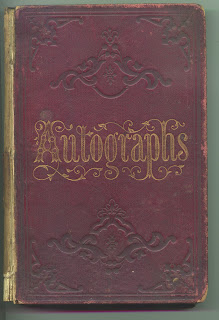George W. Askew was a graduate of the Class of 1860 from University of North Carolina at Chapel Hill. Of the 93 graduates, 92 served in the Confederate States Army. This number provides a great testimonial to the capacious impact of the American Civil War to our society. We were fortunate to discover a program from the Reunion of the Class of 1860 at Chapel Hill dated June 15, 1920.
My ggrandfather must have cherished his memories of Chapel Hill and his classmates. He maintained an autograph album of his fellow classmates and would include an entry of any information that he obtained on each individual. Displayed is G.W. Askew's autograph album with an entry on George S. Martrie, Classmate Di Society, who was killed in action on September 21st, 1863 ‘in North Alabama by bush whackers’.
It is interesting to note that the reunion program lists G.W. Askew as a Captain of a Mississippi Regiment. G.W. Askew originally enlisted with the 44th Mississippi in 1861, prior to serving in the 42nd Alabama. It is possible that he may have returned to a Mississippi Regiment toward the end of the war. I will need to do some additional research or 'chasing the family ghosts' to track this down.
Just a little additional history on the University of North Carolina at Chapel Hill:
Charted by the North Carolina General Assembly on December 11, 1789, the university's cornerstone was laid on October 12, 1793, near the ruins of a chapel, chosen because of its central location within the state. It was originally known as simply the University of North Carolina. Beginning instruction of undergraduates in 1795, UNC is the oldest public university in the United States and the only such institution to confer degrees in the eighteenth century. During the Civil War, North Carolina Governor David Lowry Swain persuaded Confederate President Jefferson Davis to exempt some students from the draft, so the university was among few in the Confederacy that managed to stay open.





No comments:
Post a Comment